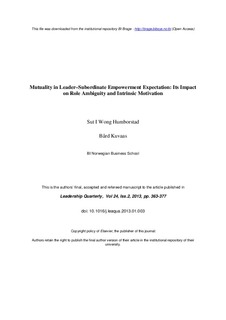Mutuality in Leader–Subordinate Empowerment Expectation: Its Impact on Role Ambiguity and Intrinsic Motivation
Journal article, Peer reviewed
Permanent lenke
http://hdl.handle.net/11250/93758Utgivelsesdato
2013Metadata
Vis full innførselSamlinger
- Scientific articles [2181]
Originalversjon
http://dx.doi.org/10.1016/j.leaqua.2013.01.003Sammendrag
Drawing on leader role set theory, we examine the relationship between the congruence of leaders’ and subordinates’ empowerment expectations and subordinates’ experiences of role ambiguity and intrinsic motivation. Based on cross-level polynomial regression analysis using 168 subordinates and 33 leaders, the results indicated that the relationship between congruence and role ambiguity and intrinsic motivation vary depending on whether leaders misevaluate subordinate empowerment expectations, as well as whether the expectations match. Specifically, subordinates had low role ambiguity and low intrinsic motivation when leaders’ and subordinates’ empowerment expectations matched at low levels and when leaders underestimated subordinates’ empowerment expectations. However, subordinates had low role ambiguity and high intrinsic motivation when expectations matched at high levels. Furthermore, role ambiguity was high and intrinsic motivation was low when the leaders overestimated subordinates’ empowerment expectations. Theoretical and practical implications are discussed.
Beskrivelse
This is the authors' final and acceptet version of the article, post refereeing. Publisher's version is available at www.sciencedirect.com
